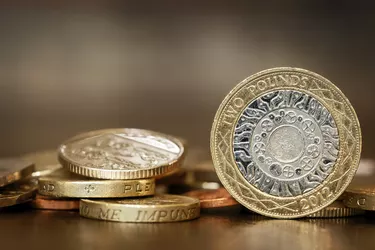If your grandfather was based in England during the war he may have had humorous tales to tell of grappling with England's offbeat coinage. The mysteries of those traditional conversions were a headache for generations of American visitors, but things are much easier now. England switched to a decimal system back in the 70s, meaning pence and pounds are just as easy to work with as dollars and cents.

Video of the Day
In For a Penny, In For a Pound
Under the old coinage system, there were 240 pence to the pound. Currently, a pound breaks down to 100 pence just as a U.S. dollar breaks down to 100 pennies. The British have more coins in circulation, though, partly because the pound has a higher value than the dollar and partly because coins are used instead of bills for small denominations. What appear to be pennies might be 1- or 2-pence coins, and there are also 5 pence, 10 pence, 20 pence and 50 pence denominations. They're much like American quarters, dimes and nickels, except for the extra two coins at the higher and lower ends. There are also coins in 1-pound, 2-pound and 5-pound denominations, so be careful when handing over a fist full of change as a tip at a cafe. Your tip could easily be more than the cost of the meal.
Video of the Day
Quick Conversion for Shopping
When you're visiting in a foreign country, and want to get a feel for how much things cost compared to where you live — "should I make room in my suitcase for this?" — it's helpful to work prices backward into U.S. dollars for comparison purposes. The U.S. dollar and U.K. pound change value every day, so this is a bit of a moving target, but checking on the day you arrive is close enough for quick mental math. At the time this was written, for example, 1 British pound was worth $1.39 USD, so if that must-read book for the flight home costs £15, it would work out to $20.85. Don't get too hung up on local cost, though, unless it's something you're planning to take home. Costs in every country will vary, so focus less on what things cost in U.S. dollars and more on whether your planned purchase is a good deal in local terms.
Exchanging Your Dollars for Pounds
Using your credit card whenever possible makes a lot of sense, while you're traveling because currency exchange is done for you automatically and you don't have to waste any thought on it. It's always a good idea to let your card issuer let you know this ahead of time, of course, so their automated fraud-prevention systems don't lock down your card when it suddenly starts ringing up purchases in London. You'll still need to exchange at least some of your dollars for pounds, though, for tips and small purchases. Fodor's advises simply using the nearest ATM: You'll pay some fees but you'll get your bank's official exchange rate on the day, often as little as a 1 percent premium. That's usually a better deal than taking a lower exchange rate from the "no fees" currency exchange at the airport. Bear in mind that those ATM fees are charged per withdrawal, so you're better off making a few large withdrawals than several small ones.
Exchanging Pounds Back to Dollars
Unless you visit the U.K. regularly, or you're keen to take home some English money as souvenirs, you'll probably want to change your pounds back into U.S. dollars before you leave. Start checking your money exchange options a day or two ahead of time, comparing them to the official exchange rate. If today's rate is $1.39 USD per pound, for example, you'd ideally choose a currency exchange operator offering $1.29 over one offering $1.14. You also have the option of waiting until you get home, and using the Travelex exchange service at the airport to turn what's left into U.S. dollars. The best option of all may be the simplest: Spend whatever U.K. currency you have left on the last day, keeping back a small reserve for coffee, drinks or snacks at the airport.